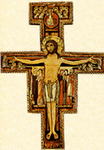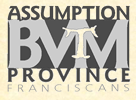The Harrowing of Hell
 This icon depicts what an early Christian homily for Holy Saturday describes in text-- Jesus Christ enters into the regions of the dead (Hades in Greek, technically not "hell" as a place of punishment). There the Lord Jesus, having been crucified and buried for all humanity enters into death, having tasted death for us all, and releases the captives held in the grip of death. Jesus has conquered and we can see him grasping our first parents, Adam and Eve, by their hands and lifting them from their tombs.
This icon depicts what an early Christian homily for Holy Saturday describes in text-- Jesus Christ enters into the regions of the dead (Hades in Greek, technically not "hell" as a place of punishment). There the Lord Jesus, having been crucified and buried for all humanity enters into death, having tasted death for us all, and releases the captives held in the grip of death. Jesus has conquered and we can see him grasping our first parents, Adam and Eve, by their hands and lifting them from their tombs.
Byzantine icon of the Resurrecton of the Lord Jesus Christ
In the Roman Rite's Easter Vigil there is a solemn proclamation of the Lord's resurrection at the beginning of the Liturgy called the Exsultet. It uses biblical imagery from the Old Testament to describe the fulfillment of the Exodus of Israel from Egypt and the Passover in the life, passion, death, burial and resurrection of the Lord Jesus on the Third Day. It also delcares that Christ is risen and victorious.
The same early Christian homily referred to above notes that Jesus brings into the regions of the dead the weapon of victory, his own life-giving Cross. While this particular icon does not show the Cross, it does colorfully demonstrate that Jesus stands upon the crossed tombstones of our first parents as he raises them and all the emblems of death are at his feet. Moreover, other figures from the Old Testament, Saints, are shown gathering around this scene of victory -- King David, John the Baptist, the Patriarchs and Matriarchs, the Prophets. All who from the very beginning of time have perished without conscious hope of resurrection are now participating in the Lord's resurrection!
And this is our hope, the hope of all who have lossed loved ones, who wonder aloud to God about the realities we face in this world of violence, of disease, of hunger, of terror; all who long for an end to suffering and death; all who are preparing for the embrace of what St. Francis of Assisi called "our Sister Death."
As we Christians of all the Rites of the Catholic Church, along with our Protestant brothers and sisters, prepare to celebrate the Lord's glorious resurrection (Eastern Orthodox Easter falls on next Sunday, 19 April 2009), let us remember that Jesus has conquered death; he is the victor over sin. There is nothing, absolutely nothing, that is impossible for God! Sacred Scripture declares is, our liturgies celebrate it; the newly baptized profess it and we renew that profession this Easter.
Christ is risen! Indeed he is risen! We Franciscan friars join in extending to you our prayer that you and your lovedones have a very happy and even life-changing Easter.





 Not so long ago there used to talk of a "Catholic vote". This meant that at least a majority of US citizens who identified themselves as Catholics tended to vote in a particular way, usually Democratic.
Not so long ago there used to talk of a "Catholic vote". This meant that at least a majority of US citizens who identified themselves as Catholics tended to vote in a particular way, usually Democratic.

 A very fine video presentation that seems to attempt to address this (with rather dramatic music, by the way) is
A very fine video presentation that seems to attempt to address this (with rather dramatic music, by the way) is  Preparing for the papal visit to the USA almost two weeks ago,
Preparing for the papal visit to the USA almost two weeks ago, 






